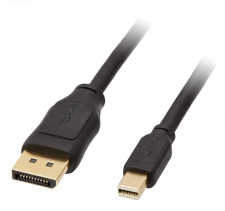DisplayPort
DisplayPort is a digital video and audio interface used to connect computers and monitors, standardized by the Video Electronics Standards Organization (VESA). The standard defines the DisplayPort connector and a smaller version called Mini DisplayPort. DisplayPort replaced the previous digital connection standard, DVI.
DisplayPort is a fully-digital interface that sends video, audio, and data signals as data packets — making it more similar to Ethernet or USB than to previous display connections. Transferring everything over a single cable allows a computer to connect to a monitor with built-in speakers and USB ports. Updates to the DisplayPort standard have increased its capabilities over time; a single DisplayPort 2.0 connection can provide a compressed video signal to a 16K (15360 x 8640) display at 60 Hz or two 8K (7680 x 4320) displays at 120 Hz.
DisplayPort is also part of the Thunderbolt interface standard. The first two generations of Thunderbolt integrated a DisplayPort signal with a PCIe interface and power connection through a Mini DisplayPort connector; 3rd- and 4th-generation Thunderbolt interfaces send those signals through a USB-C connector.
Comparison to HDMI
DisplayPort and HDMI connections have similar capabilities and are often found together on computer graphics cards. DisplayPort is designed only for computers, while HDMI is also meant for A/V equipment like televisions, audio receivers, and Blu-ray players. They both can send video and audio over a single cable, but DisplayPort also transmits USB signals. DisplayPort and HDMI have increased speeds and capabilities through several updates; any DisplayPort cable will support the most recent standard, while an updated HDMI device needs an HDMI cable of the same generation.

DisplayPort supports higher resolutions and refresh rates than HDMI, but those differences only matter on high-end displays. Because HDMI is good enough in most cases, many monitors include only HDMI ports instead of DisplayPorts.
 Test Your Knowledge
Test Your Knowledge